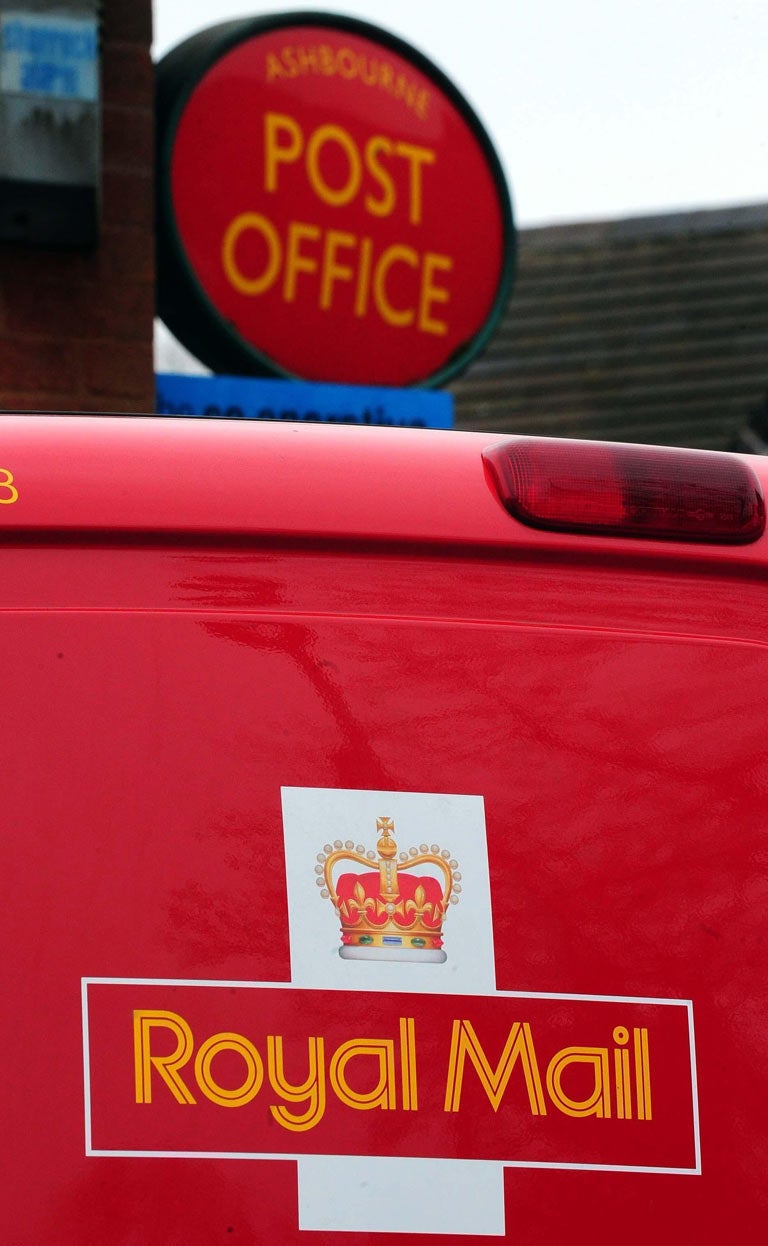
Your support helps us to tell the story
From reproductive rights to climate change to Big Tech, The Independent is on the ground when the story is developing. Whether it's investigating the financials of Elon Musk's pro-Trump PAC or producing our latest documentary, 'The A Word', which shines a light on the American women fighting for reproductive rights, we know how important it is to parse out the facts from the messaging.
At such a critical moment in US history, we need reporters on the ground. Your donation allows us to keep sending journalists to speak to both sides of the story.
The Independent is trusted by Americans across the entire political spectrum. And unlike many other quality news outlets, we choose not to lock Americans out of our reporting and analysis with paywalls. We believe quality journalism should be available to everyone, paid for by those who can afford it.
Your support makes all the difference.The Royal Mail reported increased half-year profits of £67 million today, but revealed a further slump in the number of letters being posted.
Profit for the six months to September was up from £22 million in the same period a year ago, but was entirely due to revenue from GLS European parcels and the Post Office business.
The delivery arm of the Royal Mail lost £41 million - down from £55 million a year ago - with the daily postbag falling by 6% to 59 million items, the lowest for around 20 years.
The number of employees has been cut by 5,000 in the past year, including 2,000 managers, reducing the Royal Mail's workforce to 163,000, about 50,000 less than a decade ago.
GLS made a profit of £58 million, and Post Office Limited made £55 million, with the group's financial performance and cash flow showing improvements.
Chief executive Moya Greene said "painful changes" remained to be made to secure the group's future, including increased automation and more mail centre closures.
"Our financial performance at the group level in the first half of our financial year, including our cash flow, shows some improvement on the same period a year ago.
"The necessary measures we implemented earlier in the year - increasing our prices and tight cost control - are a key part of our strategy to return Royal Mail to sustained financial viability. They are beginning to deliver results. But we have a great deal to do.
"We are halfway through our financial year and are operating within a difficult and challenging business environment. The economic downturn is proving to be prolonged and, like many other predominantly UK and European-based companies, our trading conditions are challenging.
"Our focus therefore remains on returning to sustained financial viability. We will continue to reduce our costs wherever possible without compromising the six-days-a-week service.
"We look forward to working with Ofcom to secure a new regulatory approach as the need to do so is pressing. Furthermore, it will be essential for Royal Mail that the European Commission approves the Government's state aid application to relieve the company of its historic pension liability and allow restructuring of the Royal Mail balance sheet."
Ms Greene said she was "moderately pleased" with the financial results, but she maintained there was still a "great deal" to do to return the Royal Mail to sustained financial viability.
Around 20 million fewer letters are being posted every day than five years ago, taking the daily postbag to its lowest total in 20 years, although there has been an increase in packets and parcels being posted, largely as a result of the internet.
The number of mail-processing centres has reduced by 10 to 59 in recent years and the trend will continue, said Ms Greene.
On the Government's plans to privatise the Royal Mail, Ms Greene said the business will not be able to interest investors until the "blocks" of regulation, state aid and modernisation are removed.
Dave Ward, deputy general secretary of the Communication Workers Union, said: "Better performance and improved profits is welcome news for Royal Mail and its staff, but the industry still faces major challenges to secure its future.
"We want this success to be shared with postal workers in the form of higher pay and a commitment to job security, with an extension to Royal Mail's commitment to completing modernisation with no compulsory redundancies.
"The modernisation programme has brought major change, including voluntary job losses, new machinery and equipment and changes to workplaces.
"Royal Mail workers know what's going on in terms of competition and change in the industry and the crucial thing is to reward and motivate postal workers. Any redundancies must be voluntary, not forced, and the postal service must be protected.
"Without that it doesn't matter what you do. The progress so far proves this can be successfully achieved under public ownership and clearly shows the importance of keeping the group of businesses - letters, Post Office, Parcelforce and GLS - integrated. Breaking this business up would be a disaster for UKpostal services."
PA
Subscribe to Independent Premium to bookmark this article
Want to bookmark your favourite articles and stories to read or reference later? Start your Independent Premium subscription today.
Join our commenting forum
Join thought-provoking conversations, follow other Independent readers and see their replies
Comments